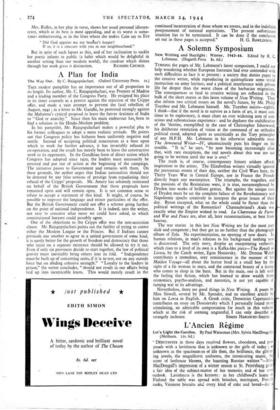A Plan for India
The Way Out. By C. Rajagopalachari. (Oxford University Press. is.) THIS modest pamphlet has an importance out of all proportion to its length. Its author, Mr. C. Rajagopalachari, was Premier of Madras and a leading member of the Congress Party. He resigned his place in its inner counsels as a protest against the rejection of the Cripps offer, and made a vain attempt to prevent the fatal rebellion of August, 1942 ; in a letter to Mr. Gandhi, he protested strongly against the Mahatma's cynical proposal to leave the future destinies of India to " God or anarchy." Since then his main endeavour has, been to find a solution to the Hindu-Moslem problem. In his pamphlet, Mr. Rajagopalachari makes a powerful plea to his former colleagues to adopt a more realistic attitude. He points out that Congress policy has hitherto been uniformly negative and sterile. Instead of accepting political concessions as a base upon which to work for further advance, it has invariably refused its co-operation, and the result has merely been to leave the constructive work to its opponents. In the Gandhian form of direct action which Congress has adopted since 1920, the leaders must necessarily be arrested and put out of action at the beginning of the campaign. The initiative passes to Government and remains with them. On these grounds, the author urges that Indian nationalists should not be deterred by any false notions of prestige from repudiating their refusal of the Cripps' proposals. Mr. Amery has solemnly reiterated on behalf of the British Government that these proposals have remained open and will remain open. It is not common sense to refuse to accept a statement of this kind. It might, of course, be possible to improve the language and minor particulars of the offer. But the British Government could not offer a scheme going further on the point of national independence. It is indeed, says the writer, not easy to conceive what more we could have asked, to which constitutional lawyers could possibly agree.
One of the objections to the Cripps offer was the non-accession clause. Mr. Rajagopalachari points out the futility of trying to coerce either the Moslem League or the Prindes. But if Indians cannot persuade one another to agree to a united government of some kind, it is surely better for the growth of freedom and democracy that those who insist on a separate existence should be allowed to try it out. Even if only six provinces decide to start together, the law of political gravity must inevitably bring others into its fold. " Independence must be built up of consenting units, if it is to rest, not on any outside force but on abiding cohesive strength." " Loyalty to the leaders in prison," the writer concludes, " should not result in our affairs being tied up into inextricable knots. This would merely result in the
continued incarceration of those whom we revere, and in the indefinite postponement of national aspirations. The present unfortunate situation has to be terminated. It can be done if the conclusion set out in these pages is accepted." H. G. RAWLINSON.


























 Previous page
Previous page